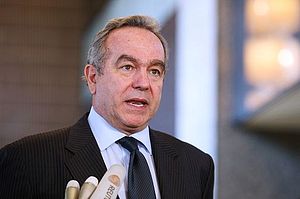During a Senate Armed Services Committee hearing on Tuesday, Kurt Campbell, Chairman and CEO of The Asia Group, told the Senators that “the lion’s share of the history of the 21st century is going to be written in Asia. There’s just no doubt about it.”
Campbell served in the U.S. Department of State under Hillary Clinton from 2009 to 2013 as assistant secretary for East Asia and the Pacific, and has been called one of the architects of the U.S. “pivot” to Asia policy.
In his remarks to the Senate committee, Campbell said that that while most would agree that economic power is shifting dramatically to the Asia-Pacific, the United States is “consumed with the Middle East and South Asia” and will be for some time. He commented that the greatest challenge for congressional and executive branch leaders would be to find the “wit and wisdom” to focus more attention on the Asia-Pacific.
Campbell noted that the “biggest concern in Asia is not just the dysfunctionality of our government, it is that we are preoccupied” away from the region and that the more the U.S. tries to convince its partners in Asia of U.S. attention, the less they believe it.
The rebalance narrative has evolved, from “we’re back in Asia “ to “we never left.” Campbell says both these assessments are right in some light but also “profoundly wrong.” He also noted that the costs associated with getting more involved in Asia have risen:
Ladies and gentlemen, for us to be effective in Asia going forward, the price of admittance to get into the disco has gone up dramatically. We’ve got to spend much more time and attention, focus more of our military, our trade, our economic engagement to be successful in Asia. That’s what’s expected…
Campbell gave a nod to the distantly looming 2016 American presidential election, noting that “one of the great benefits of Asia is that this is essentially a bipartisan commitment.” He said that whatever “small steps” have been taken to date must be sustained over several administrations going forward. Foreign policy seldom plays a pivotal role in U.S. elections, but what campaign space there is will certainly have Asia as a major issue. What to do next with the rebalance strategy President Obama will hand his successor is one of the questions candidates will have to answer on the road to the White House.
While the military aspect of U.S. engagement in Asia is the “big ticket,” Campbell emphasized how important the Trans-Pacific Partnership is. According to Campbell, the U.S. could “do everything right” diplomatically in Asia, but without the settling of the TPP would only earn a “C-” grade over the next two years.
Campbell wasn’t alone in highlighting TPP for the Senate Armed Services Committee, another panelist included in the hearing–Michael Green–said that “should negotiations on TPP falter this year, there will be new doubts about the strategic competence and staying power of the United States in Asia and the Pacific.”
Admiral Gary Roughead, USN (Ret.), whose remarks were largely devoted to assessing the growth and evolution of the PLAN as well as recommendations for how to develop U.S. capabilities with the Asia-Pacific theater in mind, concluded by saying that “TPP and TPA (Trade Promotion Authority) is extraordinarily important.” He noted that China’s One Belt, One Road strategy has two components–military and economic–and that U.S. strategy ought to couple economic initiatives with military ones.
“We can’t simply be a military one-trick pony,” he said.

































